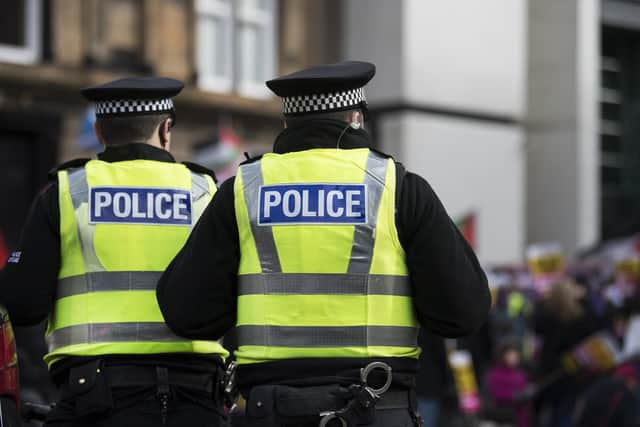Exclusive:Anger as Police Scotland pay out £16m in compensation
Taxpayers have footed a bill totalling more than £16m for compensation payouts by Police Scotland over the past five years, according to newly released figures.
Scotland’s national police force, which is under severe pressure to balance its books in the face of major budgetary constraints, has paid out more than 1,600 claims since 2018/19. The total amount spent on the compensation would cover the salaries of around 570 newly qualified constables.
Advertisement
Hide AdAdvertisement
Hide AdThe vast majority of the payments made by the force, which has been the subject of stern criticism over its working culture over the past year, were for employer liability settlements following claims made by officers and staff. Those payouts totalled more than £8.5m over the past five years, and included two cases where seven-figure payments were made.
Over a quarter of the compensation total - more than £4.6m - went on motor liability claims for accidents involving police officers. The motor claim payouts, which cover a range of incidents, climbed to a five year high in the last financial year.
Police Scotland has also paid out over £3.1m in compensation arising from public liability claims over the five year period. There were 333 such claims against the force, at least four of which resulted in six figure payouts.
The details of the compensation payments will raise further questions for the force at a time when its finances are under scrutiny as a result of government cuts. Its outgoing chief constable, Sir Iain Livingstone, warned earlier this year that funding problems meant the service would be unable to maintain existing workforce levels.
In all, the total compensation payments agreed since 2018/19 amount to £16,443,021. The sums were revealed during an online meeting of the Scottish Police Authority’s (SPA) legal committee earlier this week.


The employer liability claims included the high profile case involving former firearms officer, Rhona Malone, who was awarded almost £1m after an employment tribunal found she had been victimised. The tribunal accepted evidence that the culture in parts of armed policing was "horrific," and an "absolute boys' club."
One of the largest public liability claims during the period in question was to the family of Lamara Bell, a 25 year-old who died with her partner, John Yuill, after being left for three days in a crashed car on the M9 motorway in 2015. The force, which previously admitted failures with its call-handling system "materially contributed" to the death of Ms Bell, paid out more than £1m in 2021.
Scottish Conservative justice spokeswoman, Sharon Dowey, said: “The millions being shelled out by Police Scotland on compensation payouts means fewer resources to keep our communities safe. The public expect money to be spent on frontline policing rather than being frittered away on shady backroom deals and costly legal fees.
Advertisement
Hide AdAdvertisement
Hide Ad“Police budgets are already overstretched due to years of SNP cuts so a further squeeze will have a devastating impact at a time of rising crime. The buck stops with the SNP. Many of these costly payouts relate to their broken police complaints system. If ministers stopped dithering and finally fixed it, payments would inevitably reduce.”
The SPA committee meeting heard from James Douglas, Police Scotland’s legal services manager, who described the payments over the five year period as “relatively stark.” He explained: “Over the past five years, the overwhelming majority of cases do settle at relatively low amounts, but there are outliers, and obviously it’s the outlier cases that are brought to this committee and discussed by this committee in the private session. The committee are aware of the cases that do attract those large sums.
“What I would say is that I think there is a relatively consistent level and that there’s nothing there to say, ‘What on earth was happening in 2022?’ with a 30 per cent increase in employer cases or something like that. That’s not borne out by the figures. It tends to be relatively uniform, with a dip in 2021, which I can only assume is down to the fact that society was in a lockdown.”
Documents prepared for the committee meeting also showed that Police Scotland’s motor claim payouts totalled more than £1m in 2022/23, a near 30 per cent increase on the previous 12 months. There were 231 motor claims brought against the force in 2022/23, the highest level since 2019/20.
Mr Douglas said the rise was due to the cost of the repairs being carried out, as opposed to a spike in the number of incidents. “The number of claims coming in are by and large the same as they’ve always been,” he explained. “However, the labour costs for fixing vehicles has gone up, the parts costs has gone up, and unfortunately, some of the times where we’ve had to keep people in hire vehicles has extended because there are difficulties in getting parts.
“That has resulted in a real life increase. There’s nothing there per se that suggests there’s anything untoward, it’s simply an illustration of real time cost increases in the real world.”
The SPA committee also heard that work is ongoing to produce a publication detailing the force’s use of non disclosure agreements. It is expected that the report will be completed by next March.
A Police Scotland spokeswoman said: “Compensation payments are dealt with on a case by case basis with a view to securing best value for the public purse. A significant proportion of payments can be attributed to a small number of cases.”
Advertisement
Hide AdAdvertisement
Hide AdA Scottish Government spokesman said: “We have introduced the Police (Ethics, Conduct and Scrutiny) (Scotland) Bill to the Scottish Parliament, which combined with the recommendations delivered from Dame Elish Angiolini's independent review of police complaints handling, investigations and misconduct, will embed good practice and maintain the high standards expected of police.”